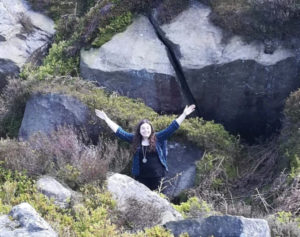Our next WRDTP student rep profile is here… This week we are introducing you to Molly Patterson, a freshly minted DTP rep with a passion for the very relevant as of recent topic of virology!
Molly joined the DTP in 2018 at the University of Leeds after her integrated masters at Leeds. Remaining at the Mcdonald lab, she resumes addressing central questions in the field of virology and cancer. Read about her recent publication here: https://pubmed.ncbi.nlm.nih.gov/32555725/
Check out our Q&A session in full!
What inspired you to do science?
I think it’s hard to pin down one single thing that inspired me to do science. I’ve always been fascinated with how things work and using problem-solving. I also think I had some great teachers and lecturers both at A-levels and my undergraduate degree, respectively, that showed me what an interesting career one can make in science, without necessarily pursuing medicine.
If you could summarise what you research in one sentence, what would you say you do?
I study how HPV dysregulates signalling in cervical cancer, focusing on the Hippo pathway.
How did you get into it?
I always found virology interesting throughout my undergraduate degree, especially in relation to cancer. Therefore, I was interested in lab groups which focused on this. As part of my Microbiology integrated masters, I did a 6-month placement at the Macdonald group and stayed on as I thought it was right for me!
What do you value most about working in science?
I value that each day is different and brings different challenges. I enjoy collaborating with other scientists and working on something novel. I enjoy how varied it can be, the broad scope it can have. Learning new techniques and experiments gives you an overall flexibility that you wouldn’t find in other jobs.
What was the biggest challenge you faced when settling into your PhD?
Having to be flexible to come up with ideas when things don’t work. Additionally, there are times when you can be so involved in the PhD that you can get too bogged down if experiments don’t work. It’s important to prevent that from happening and have a good work-life balance. Trying to achieve this has been the biggest challenge.
What do you do when you’re not doing science?
I try to make time to meet friends. I look forward to the end of the week to meet them and go for a coffee. Even though I can’t meet my friends in person during lockdown, we still meet virtually during the week and do virtual pub quizzes once or twice a week. Living with other people, I also go on group walks as well.
Why did you decide to become a student rep?
Becoming a student rep is a great way to enhance my skill set and focus on skills that you might not necessarily get in the lab because there are not many opportunities. One example where I can improve upon outside the lab are communication skills which are still vital for research. Moreover, planning for the symposium and coming up with various avenues as to how we could hold it in person or virtually, I am developing my problem-solving and troubleshooting skills.

